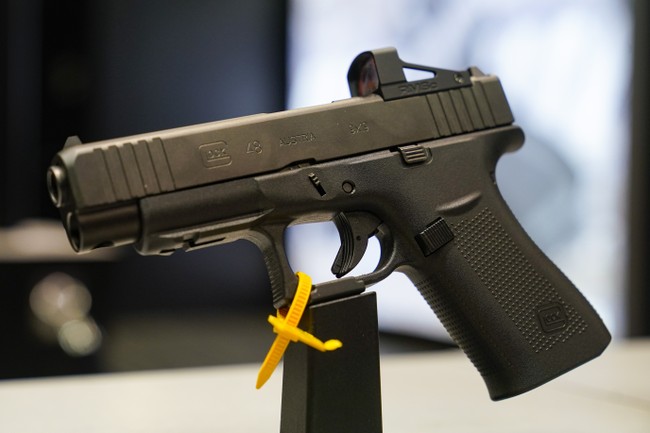Glock has been in the center of controversy, and it hasn’t been because they did anything wrong. In fact, strangely enough, it’s the fact that they didn’t do anything–at least, not until recently–which is what they’re being blamed for.
In particular, they didn’t redesign their firearms so a device they’ve never made and is illegal to possess couldn’t be put on the guns that were never designed to use it.
While Glock did eventually succumb to pressure and pull existing models of its guns in order to introduce a new model that addresses these complaints, it still did nothing wrong.
But Illinois is suing them just the same, and recently, a judge said the lawsuit could proceed.
That’s a decision that Glock vehemently disagrees with.
Firearms maker Glock is asking for permission to appeal a Cook County judge’s ruling allowing the city of Chicago to continue its lawsuit against Glock for “deceptive practices” in the sale and marketing of their popular semiautomatic pistols, as the gunmaker argues the judge’s take on the legal permissibility of the city’s lawsuit rests on shaky and unproven legal ground.
Glock filed the motion in mid-October in Cook County Circuit Court, asking Cook County Judge Allen P. Walker to allow the company to request an appeals court to review Walker’s September ruling declaring that neither the city’s lawsuit nor the state consumer fraud law on which it rests don’t violate the Second Amendment, federal law or a recent U.S. Supreme Court decision concerning legal actions seeking to make gunmakers pay for the acts of criminals using their weapons.
The motion for appeal comes as the latest step in Glock’s bid to defend itself against the city’s bid to use its lawsuit to not only secure a potentially massive payout from Glock, but also secure a court order effectively barring Glock pistols from being sold in Chicago.
The lawsuit was filed by City Hall at the direction of Mayor Brandon Johnson last year. Johnson and City Hall partnered in the action with gun control activist organization Everytown USA, which routinely supports laws to ban firearms in states, cities and nationwide.
The lawsuit has specifically accused Glock of violating an Illinois state law and a related Chicago city ordinance by selling semiautomatic pistols that can be converted to fully automatic weapons by illegally installing an aftermarket “switch,” known as an “auto sear,” which is not made or sold by Glock.
Of course, Glock doesn’t sell directly to consumers. It rarely sells directly to gun stores, even. Instead, it sells mostly to distributors who then sell to gun stores, which alone should mean Glock isn’t responsible for any of this.
But again, a big issue is that they didn’t design the switches in the first place. The switches were designed around what Glock built. That means it’s entirely likely that no matter what they do, someone will still find a new way to convert the firearms to full-auto, even without Glock intending them to do any such thing.
One of Glock’s big arguments against this is that the law is framed in such a way that it doesn’t meet the applicable exemptions to the Protection of Lawful Commerce of Arms Act.
Glock noted two federal appeals courts that have addressed the “predicate exception” question under the PLCAA have determined that so-called “statutes of general applicability do not satisfy the predicate exception simply because they also apply to the firearms industry.”
“There is a substantial ground for a difference of opinion regarding whether the Illinois Consumer Fraud Act is the type of statute applicable to the sale and marketing of firearms, the alleged violation of which is capable of satisfying the predicate exception, simply based on adding a reference to firearms to a statute of general applicability, and whether Congress intended to allow states to essentially negate the immunity provided by the PLCAA in such a manner,” Glock wrote in its brief.
Unfortunately, Illinois is far from the only state to try stuff like this, and it’s clear the courts are going to have to rule on this one way or another, but the problem is, and has always been, that states seem to think gun companies should be held responsible for what other people do.
That’s why the PLCAA was passed in the first place. Lawsuits clogged the courts with people trying to sue gun manufacturers because they got shot by a criminal using one of that company’s firearms. They didn’t sell the gun, but they were supposed to be responsible for what other people did with firearms, especially stolen ones.
It was insane.
Now, we’re right back there with this crap and the laws trying to hammer gun companies for their marketing material because someone used one of their guns in a mass shooting, even if they can’t prove the killer ever saw the marketing stuff. It’s more than insane, it’s inane.
Glock is, understandably, fighting back on this because they know they shouldn’t be held responsible. Yeah, they redesigned their guns, but they shouldn’t be held liable because they didn’t do it years ago. You can’t just will a redesign into existence. We don’t know how long they were working on this, and because they weren’t doing anything wrong in the first place, you can’t legitimately claim they should have just stopped all production until they had the new design worked out.
Then again, if we want reason, we’d be idiots to look to gun control states for it.
Editor’s Note: President Trump and Republicans across the country are doing everything they can to protect our Second Amendment rights and right to self-defense.
Help us continue to report on their efforts and legislative successes. Join Bearing Arms VIP and use promo code FIGHT to get 60% off your VIP membership.
Read the full article here





